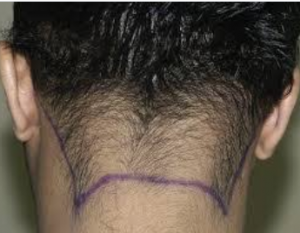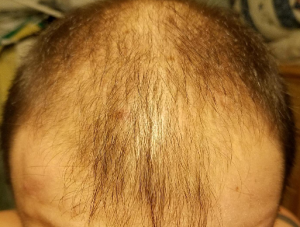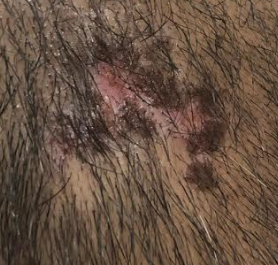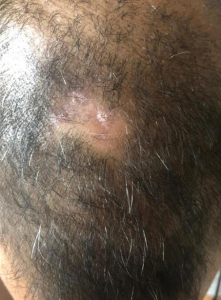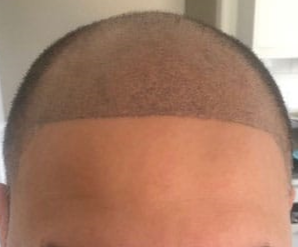I have developed a mature hairline already and am concerned that I may get more hair loss. What should I do?
With a mature hairline at your age you will not know if you are losing hair (look to your family history) or if you are going to lose more hair. As long as you have testosterone produced by your testicles, you will lose hair if you have genetic balding. To find out, get a HAIRCHECK test to see if there is hair loss behind the hairline. Then you may have more decisions to make if the test is positive for hair loss.
I know you’re not supposed to brush wet hair after the shower, but I didn’t know that until today… After I’ve been doing it for years… Thankfully, currently, I have a pretty full head of pretty thick hair and I’m obviously prepared to stop brushing my wet hair indefinitely. However, I’m worried that I’ve done damage that can’t be undone that could eventually lead to severe hair loss in the future. Should I be concerned?
When people brush hair roughly, then they can pull out miniaturized hairs easily causing evident balding in those men or women with genetic hair loss and significant miniaturization. I tell people to use gentle brushing or a wide tooth brush or comb to minimize the pulling effect on these miniaturized hairs.
I am devastated. No girl would even talk with me. I feel like I have been isolated from everything that someone of my age should be involved in. I never take off my baseball hat anywhere I go.
Topical finasteride with minoxidil might work and is worth a try if you can’t handle the oral finasteride but considering your age I would want to work a Personalized Master Plan with you so we could plan for your future professionally. You might respond to the use of a dermaroller as well if you add it to your routine and apply the minoxidil immediately after using it.
Does miniaturized hair gradually grow shorter with each cycle or can a miniaturized hair be long, say 5-6 inches then fall and stop growing?
At the start of the year my hair was thick but after a stressful couple of months, all my hair turned super thin with bald patches. The hair turned so thin it has very wide partings. Also all my body hair thinned too. Beard, arms, legs and pubic area. It’s like every hair on my body miniaturized. I can see my scalp now with wet hair. It all happened quickly, this wasn’t a gradual thing. The hair texture feels weird. My beard hair has thinned the same. I had thick hair on arms and legs now it’s all very fine. My pubes are now thin and wispy. I started taking fin a few months ago. I was prescribed it for prostate. Will this help? I can’t find anything about this when searching the net, only TE but does hair thin during that? At the start of the year I was very stressed, hardly eating or sleeping for a couple of months which I”m sure caused this.
Let’s imagine a hair that grows out for two years and is 12 inches long. If miniaturized started into the second year, the hair closest to the scalp would be thinning then the hair at the end which was made 2 years earlier. So a miniaturized hair can be seen simply by pulling out a long hair and looking at both ends. Another aspect of these miniaturized hairs is that they will grow slower and slower over time, eventually they stop growing and just stay there, falling out with washing, brushing and just the wind.
There is another condition that I just recently defined in the literature called Age Related Thinning. In this situation, all of the scalp hairs become thinner all at once and it is uniform thinning throughout the scalp. Although this is more common in men and women over 50, it does appear in younger men and women. I have seen it in men in their 20s and they make the mistake to think that this is balding because they can see through the hair to the scalp. There is no known treatment for this and neither minoxidil nor finasteride can reverse this as I know it. This is my article about it: https://newhair.com/pdf/Kumaresan-Muthuvel-Bernstein-Rassman-Commentary.pdf
Basically I’ve been on finasteride now for 6 weeks and my sex drive has shot right up. Is this normal? I thought finasteride has the opposite effect.
My own son reported it when he went on finasteride. His girlfriend loved it. I have heard this from many men. Few come forward on forums, just those who lose their sex drive.
Do you happen to know if topical fin is considered safer in terms of side effects then oral?
For those who have no side effects, oral finasteride is fine. For others, the topical may be a better solution as it is reported to have far less side effects.
This article discusses microneedling and shows many photos of men before and after its use
https://www.hairliciously.com/blogs/news/the-best-before-after-microneedling-and-derma-roller-results-for-hair-growth
Took fin orally and got bad sides, stopped and they went away quickly but hair loss is back lol. I’ve read studies about topical finasteride working to an extent and producing no side affects as DUT is only reduced 5% systemically. How to make it but without using minoxidil as the aqueous solution in the mix?
Mixing finasteride pills with alcohol will not give you anything worthwhile. The drug has to be mixed professionally with a liposomal compound that can allow it to go through the skin.
I get side effects from fin so I can’t take it. I’m 23 and thinking at 25 I’ll get a hair transplant. I was wondering if I’m required to take fin for it to work.
Finasteride protects young men (under 30) from shock loss after a hair transplant. When a young man doesn’t take it, they run a risk if significant shock loss of the native hair. Many surgeons don’t use finasteride with surgery in young men, and these men are writing or calling me all of the time about their shock loss.
I am a 24 years old guy with a clear cut norwood 3. My hairline receded obviously, I am not so sure about all around density but I guess the hair are thinner (cannot tell visually but it feels off). So it is pretty clear that I will follow my father’s pattern of balding which means I am headed to norwood 7. The thing is, my father only lost hair on top at 35-37. Also , he had an afro which means his density loss was hard to notice until it really advanced. My hair were always thinner than his, they are straight so I feel I might be noticebly bald faster.
Just out of curiosity, does on follow your father’s pattern and timeline regarding baldness? Would be nice to know if it is wise to look at when my pops lost his hair.
Some people do and some don’t, I just saw a man yesterday who has a very bald father and brother who were bald before they were 28, but he was like you with a Class 3 pattern at 30 years old. He was worried he might go like his dad, but I told him that very bald men are always bald by the time they are 30, so not to worry.
So I’ve been taking Finasteride for about 2.5 years with no problems at all and with very good results. However, I recently did a hormone check and my Prolactin was very high (almost double the normal range). Now while I feel fine and don’t have any of the symptoms of high prolactin would you recommend I stopped the fin? Is there a chance this could be causing my very high prolactin levels? Any help would be really appreciated as I am a bit worried about what the future may hold.
There is information that is difficult to integrate with a high prolactin level in men. We don’t know, for example, that this was caused by finasteride. You should see your doctor for clarification of the issues which gets confusing as you can see below.
This is what I found in the internet: Men — When a high blood prolactin concentration interferes with the function of the testicles, the production of testosterone (the main male sex hormone), and sperm production. … High levels of prolactin in the blood also cause difficulty in getting an erection, as well as breast tenderness and enlargement.
One common cause of hyperprolactinemia is a growth or tumor on the pituitary gland called a prolactinoma. The tumor produces high levels of prolactin. … Large tumors can also cause headaches, vision problems, or both. Prolactinomas are more common in women than in men and rarely occur in children
In Men — When a high blood prolactin concentration interferes with the function of the testicles, the production of testosterone (the main male sex hormone), and sperm production. Low testosterone causes decreased energy, sex drive, muscle mass and strength, and blood count (anemia).
That is why you need to see your doctor.
Post-finasteride syndrome: An emerging clinical problem
Abstract
The presence of side effects during pharmacological treatment is unfortunately a quite common problem. In this review, we focused our attention on adverse events related to 5 alpha-reductase (5?-R) inhibitors (i.e., finasteride and dutasteride), approved for the treatment of benign prostatic hyperplasia and androgenetic alopecia (AGA).
Although these drugs are generally well tolerated, many reports described adverse effects in men during treatment, such as sexual dysfunction and mood alteration. In addition, it has been also reported that persistent side effects may occur in some AGA patients. This condition, termed post-finasteride syndrome (PFS) is characterized by sexual side effects (i.e., low libido, erectile dysfunction, decreased arousal and difficulty in achieving orgasm), depression, anxiety and cognitive complaints that are still present despite drug withdrawal. Indeed, some national agencies (e.g., Swedish Medical Products Agency, the Medicines and Healthcare Products Regulatory Agency of UK and the U.S. Food and Drug Administration) required to include multiple persistent side effects within the finasteride labels.
As here reported, these observations are mainly based on self-reporting of the symptomatology by the patients and few clinical studies have been performed so far. In addition, molecular mechanisms and/or genetic determinants behind such adverse effects have been poorly explored both in patients and animal models. Therefore, results here discussed indicate that PFS is an emerging clinical problem that needs to be further elucidated.
This article in full can be found here: https://www.sciencedirect.com/science/article/pii/S235228951930061X?via%3Dihub#bib122https://www.sciencedirect.com/science/article/pii/S235228951930061X?via%3Dihub#bib122
http://tau.amegroups.com/article/view/39898/html
Original Article
Penile vascular abnormalities in young men with persistent side effects after finasteride use for the treatment of androgenic alopecia
Mohit Khera1, Jeffrey K. Than2, James Anaissie1, Ali Antar1, Weitao Song1, Boriss Losso1, Alexander Pastuszak3, Taylor Kohn4, Jorge Rivera Mirabal1
1Scott Department of Urology, Baylor College of Medicine, Houston, TX, USA; 2Baylor College of Medicine, Houston, TX, USA; 3Division of Urology, Department of Surgery, University of Utah School of Medicine, Salt Lake City, UT, USA; 4The James Buchanan Brady Urological Institute at Johns Hopkins School of Medicine, Baltimore, MD, USA
Contributions: (I) Conception and design: All Authors; (II) Administrative support: All authors; (III) Provision of study materials or patients: M Khera; (I) Collection and assembly of data: All authors; (I) Data analysis and interpretation: All authors; (I) Manuscript writing: All authors; (I) Final approval of manuscript: All authors.
Correspondence to: Mohit Khera, MD. Professor, Scott Department of Urology, Baylor College of Medicine, 7200 Cambridge St, Suite 10B, Houston, Texas 77030, USA. Email: mkhera@bcm.edu.
Background: The constellation of persistent sexual, neurological, and physical adverse effects in patients who discontinue 5?-reductase inhibitors (5ARIs) has garnered recent concern. The objective of this study was to evaluate potential penile vascular changes and persistent adverse effects of 5ARIs in men treated for androgenic alopecia (AGA).
Methods: This was a prospective case-control study with 25 subjects with a history of 5ARI use for AGA and 28 controls. Patient self-reported questionnaires including the International Index of Erectile Function (IIEF), International Prostate Symptom Score (IPSS), Patient Health Questionnaire-9 (PHQ-9), the Epworth Sleepiness Scale (ESS) and the Androgen Deficiency in the Aging Male (ADAM) were used. Penile duplex Doppler ultrasound (PDDU) results were evaluated in men with a history of 5ARI use.
Results: A significant difference in total IIEF score between the 5ARI (median: 35; IQR: 29–43) and control group (median: 29; IQR: 27–32) (P=0.035) was observed. Seventeen 5ARI subjects (68%) had a vascular abnormality on PDDU. The median (IQR) for total IPSS score for the 5ARI group was 10 [5–16] compared to 3 [2–8] for the controls (P<0.01). The 5ARI group had a higher median total PHQ-9 score than controls [10 (6.5–16) vs. 1 (0–2) (P<0.001)]. Two subjects (8%) committed suicide during or after the study.
Conclusions: While the sexual side effects of 5ARIs are well known, there may be persistent genitourinary, physical, psycho-cognitive, anti-androgenic and penile vascular changes after 5ARI discontinuation. Use of 5ARIs for treatment of AGA may lead to persistent sexual, genitourinary, physical, psycho-cognitive, and anti-androgenic sequelae even after cessation of 5ARI therapy.
Keywords: Finasteride; penile duplex Doppler; major depressive disorder; hypogonadism; erectile dysfunction (ED)
https://wjmh.org/search.php?where=aview&id=10.5534/wjmh.200012&code=2074WJMH&vmode=FULL
| Health Risks Associated with Long-Term Finasteride and Dutasteride Use: It’s Time to Sound the Alarm | |
| Abdulmaged M. Traish |
|
| Department of Urology, Boston University School of Medicine, Boston, MA, USA.
|
|
Abstract
|
|
| 5?-dihydrotestosterone (5?-DHT) is the most potent natural androgen. 5?-DHT elicits a multitude of physiological actions, in a host of tissues, including prostate, seminal vesicles, hair follicles, skin, kidney, and lacrimal and meibomian glands. However, the physiological role of 5?-DHT in human physiology, remains questionable and, at best, poorly appreciated. Recent emerging literature supports a role for 5?-DHT in the physiological function of liver, pancreatic ?-cell function and survival, ocular function and prevention of dry eye disease and kidney physiological function. Thus, inhibition of 5?-reductases with finasteride or dutasteride to reduce 5?-DHT biosynthesis in the course of treatment of benign prostatic hyperplasia (BPH) or male pattern hair loss, known as androgenetic alopecia (AGA) my induces a novel form of tissue specific androgen deficiency and contributes to a host of pathophysiological conditions, that are yet to be fully recognized. Here, we advance the concept that blockade of 5?-reductases by finasteride or dutasteride in a mechanism-based, irreversible, inhabitation of 5?-DHT biosynthesis results in a novel state of androgen deficiency, independent of circulating testosterone levels. Finasteride and dutasteride are frequently prescribed for long-term treatment of lower urinary tract symptoms in men with BPH and in men with AGA. This treatment may result in development of non-alcoholic fatty liver diseases (NAFLD), insulin resistance (IR), type 2 diabetes (T2DM), dry eye disease, potential kidney dysfunction, among other metabolic dysfunctions. We suggest that long-term use of finasteride and dutasteride may be associated with health risks including NAFLD, IR, T2DM, dry eye disease and potential kidney disease. |
Page 3 of 7

